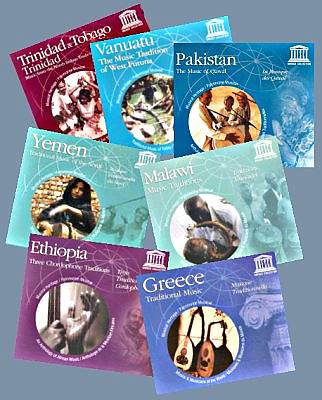The UNESCO Collection of Traditional Music of the World included more than a hundred pioneering audio recordings of the world’s traditional music published from 1961 to 2003 on a number of different recording labels. The series was launched in 1961 in collaboration with ethnomusicologist Alain Daniélou (1907-1994) and the International Music Council (created by UNESCO in 1949).

© UNESCO
The UNESCO Collection was composed of several subseries of recordings published on LP vinyl records and produced, published and distributed by different labels and companies:
- Musical Sources,
- Musical Atlas,
- A Musical Anthology of the Orient,
- An Anthology of African Music and the
- Anthology of North Indian Classical Music.
The recordings in the Collection are mostly field recordings made in situ, in their original context. Each recording was accompanied by scholarly annotations and photographs. Together, these disks are a reflection of the immense variety of music making and of the position music holds within cultures around the globe.
From the beginning of the 1990s, most of these recordings were reissued on CD by the label Auvidis, which later became Naïve. Until 2003, a total of 115 CD titles were released. These reissues, new issues and compilations were made available under five new series:
- Music and Musicians of the World,
- Anthology of Traditional Music,
- Traditional Music of Today,
- Celebration Collection and
- Listening to the World.
Since the termination of the collaboration with Naïve in 2005, UNESCO established a new partnership with Smithsonian Institution in 2009 to make more than 100 albums of the Collection spanning more than 70 nations on every continent available to the general public. This project will for the first time make these recordings, including 12 previously unreleased albums, available on CD, digital download, streaming services, and library subscription. It includes:
- Afghanistan: Music in during the Civil War (1979–2001)
- Fiji: Songs of Love and Homeland—String Band Music
- Japan: Koishimaru Izutsuya: Master of the Kawachi Ondo Epics
- Oman: Arabian Weddings
- Peru: Andean Music of Life, Work, and Celebration
- Portugal: Festas in Minho
- Portugal: Music and Dance from Madeira
- Romania: Festive Music from the Maramureş Region
- India: Ranganayaki Rajagopalan—Continuity in the Karaikudi Vīṇā Style
- Uzbekistan: Echoes of Vanished Courts
- Uzbekistan: Musical Traditions of the Karakalpaks
- Venezuela: Afro-Venezuelan Music, volumes I and II